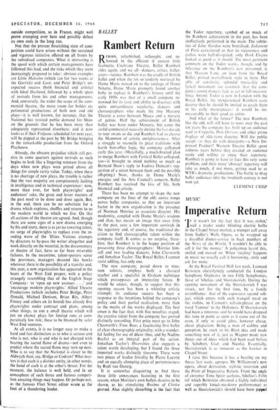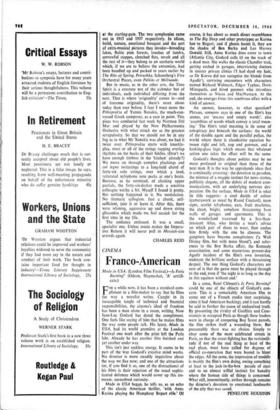Imperative Return
MUSIC IF it wasn't for the fact that it was stolen,' said a trader under blinding electric bulbs in the Chapel Street market, a trumpet call away from Sadler's Wells Opera, as he wrapped up a dreadful dinner-service in back numbers of the News of the World, 'I wouldn't be able to sell it for the money.' A policeman heard this, smiled and moved on. When 'stealing' happens in music we usually call it borrowing, smile and ask for more.
At the Royal Festival Hall last week, Leonard Bernstein electrifyingly conducted the London Symphony Orchestra in two Fifth Symphonies, those of Sibelius and Shostakovich. During the opening movement of the Shostakovich I was struck, not for the first time, by a family resemblance: that of the espressivo second sub- ject, which enters with such tranquil tread on the violins, to Carmen's refrain-phrase on the word Tarnow.' in the Habanera. If Shostakovich had been a timorous soul he would have dropped this tune in panic as soon as it came out of the oven, if only to avoid gibes, however cheap, about plagiarism. Being a man of calibre and gumption, he stuck to his Bizet idea and made something new of it, just as Wagner made new things out of ideas which had been used before by Schubert,' Liszt and Nicolai. Essentially, Shostakovich is as innocent as the hawker in Chapel Street.
I raise this because it has a bearing on my theses last week, apropos Mr Williamson's new opera, about derivation, stylistic reversion and the Point of Imperative Return. From the angle of extremer Time Spirit acolytes, Sibelius's Fifth (of which Bernstein obtained a highly individual and superbly knock-me-down performance) as well as Shostakovich's should have been pipped
at the starting-gate. The two symphonies came out in 1915 and 1937 respectively. In idiom, build, texture, emotional bouquet and the sort of extra-musical pictures they invoke—brooding lakes, Baltic pine forests, touches of tundra, sorrowful steppes, clenched fists, revolt and all the rest of it—they belong to an aesthetic world which, if we are to believe the extremists, had been bundled up and packed in years earlier by The Rite of Spring, Petrushka, Schoenberg's Five Orchestral Pieces, even Pelleas et Melisande.
But in music, as in the other arts, the Time Spirit is a creature not of the calendar but of individuals, each individual differing from the next. That is where 'originality' comes in—and of tiresome originality, there's more about today than ever before. I fear I must name the Pithoprakta of Yannis Xenakis, the much-can- vassed Greek composer, as a case in point. This piece was conducted last week by Norman Del Mar and played by the New Philharmonia Orchestra with what struck me as the greatest scrupulosity. So that we should not be in any fog as to what Mr Xenakis was about, we had it twice over. Pithoprakta starts with knuckle- play, most or all of the strings rapping overlap rhythms on the backs of their fiddles. (Don't we have enough timbres in the 'kitchen' already?) We move on through complex pluckings and col legno twitterings to a long-held chord of forty-six solo strings, over which a loud, reiterated xylophone note pecks at one's brain. Because, as he surmised, of clashing upper partials, the forty-six-decker made a sensitive colleague writhe a bit. Myself I found it pretty. But nothing happened to it. No modulation. No thematic syllogism. Just a chunk, self- sufficient, take it or leave it. After this, there were whining, aggressive up and down string glissandos which made me feel seasick for the first time in my life.
The audience enthused. It was a small, specialist one. Unless music makes the Impera- tive Return it will never pull in Messiah-size crowds again.
CHARLES REID































 Previous page
Previous page